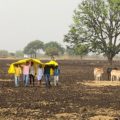Multiple resilience dividends at the community level: A comparative study on disaster risk reduction interventions in different countries
Working paper by Viktor Rözer, Swenja Surminski, Finn Laurien, Colin McQuistan, Reinhard Mechler on 22 Apr 2021
The concept of ‘multiple resilience dividends’ is not yet widely applied. This paper analyses the knowledge gaps and challenges that arise from applying ‘multiple resilience dividends’ in the planning, implementation and evaluation of disaster risk reduction interventions at the community level.








